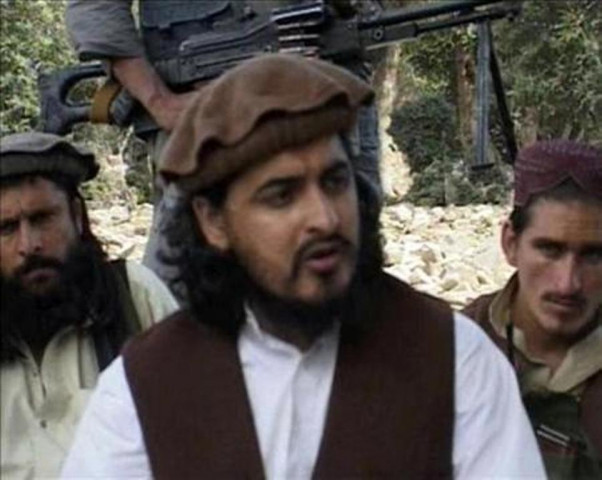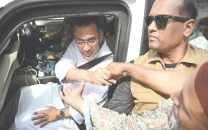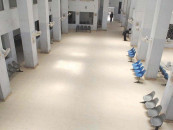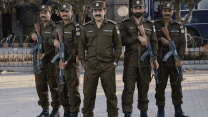Hakimullah's death plunges TTP into dangerous disarray
Hakimullah Mehsud's death this month has set off a power struggle within the outfit's ranks.

Late TTP chief Hakimullah Mehsud (C) sits with other millitants in South Waziristan. PHOTO: REUTERS
Hakimullah Mehsud's death this month has set off a power struggle within the outfit's ranks, which could further unnerve a region already on tenterhooks with most US-led troops pulling out of neighbouring Afghanistan in 2014.
When a tribal council declared Mullah Fazlullah as the new leader of TTP last week, several furious commanders from a rival clan stood up and left.
"When Fazlullah's name was announced, they ... walked out saying, 'The Taliban's command is doomed'," said one commander who attended the November 7 'shura' meeting in South Waziristan, a lawless tribal region on the Afghan border.
Others at the shura declared loyalty to the hardline new leader and stayed on to map out a plan to avenge Hakimullah's death through a new campaign of bombings and shootings.
"This is the start of our fight with the Pakistan government, an American puppet," the Taliban official said.
"Those who forced the Soviet Union out of Afghanistan are capable of breaking up Pakistan," he added, alluding to senior commanders whose rite of passage into war started with the rebellion against Soviet troops in Afghanistan in the 1980s.
TTP have always been divided, a loose alliance of militant bands united only by extremist beliefs and their hatred of the government and all things Western. The group operates independently of its Taliban allies in Afghanistan, who are fighting US-backed forces there.
But the death of Hakimullah, a member of the dominant Mehsud tribe, and the rise of Fazlullah, a Swat Valley native and hence an outsider in the eyes of tribesmen, changes the picture in TTP.
Under Hakimullah, the TTP had been open to the idea of peace talks with the government, even though no meaningful negotiations had taken place.
Fazlullah ruled out any talks and declared the start of a new campaign to attack government and security installations in Punjab, Prime Minister Nawaz Sharif's political base.
"Mehsuds are not only not happy with this appointment but there are reports of serious infighting among them that might come to the fore in the near future," said Saifullah Mahsud, director of think tank FATA Research Center.
"I think for now the anti-peace talks group among the TTP has prevailed and hence the appointment of Fazlullah," said Mahsud, who compiles data based on information provided by his sources on the ground in the tribal Pashtun areas.
Afghan links
Fazlullah's threat against Punjab has unnerved Pakistan's most prosperous and populous province, where attacks have so far been rare.
Various militant groups, including the Sipah-e-Sahaba, Lashkar-e-Jhangvi and Jaish-e-Mohammad, are based around Punjab and have been long tolerated or even sponsored by powerful military and intelligence establishment.
Some of them were set up to fight Indian forces in disputed Kashmir, but they have turned on Pakistan in recent years thanks to the growing influence of the TTP and al Qaeda, and have become increasingly involved in Taliban affairs.
"The situation is getting out of control and the ISI knows that," said one Western diplomat in Islamabad, referring to the military's powerful intelligence arm.
As the dynamic within the militancy evolves, powerful Punjabi groups are also beginning to turn their heads westwards, with many seeing the pullout of US troops from Afghanistan as a chance to expand their reach to tribal areas.
During a recent meeting with Reuters in the Pashtun city of Mardan, a group of militants - who sat cross-legged on the floor of a mud-brick safe house sipping tea and eating biscuits - said the Afghan cause was close to their hearts
"We want peace in Afghanistan under Mullah Omar's leadership," said Abdurakhman, a militant with Jaish-e-Mohammad, a group usually focused on Kashmir, others nodding in agreement. Mullah Omar is the chief of the Afghan Taliban.
"When the Americans leave, elders will sit down with Mullah Omar and decide. If there is a need to fight, we will recruit and send people there."
Sitting next to him, Farhatullah, a middle-aged man with the Hizbul Mujahideen group, said he used to fight against Indian forces in Kashmir but was now ready to go to Afghanistan.
"We are the reserve force," he said. "If needed I will ... take my gun, go there and fight."
Rift
The TTP publicly rubbishes any talk of a major rift among its ranks.
A Taliban spokesman has confirmed Fazlullah's appointment and said there would be no more peace talks with the government.
Operatives from al Qaeda and the Haqqani network, a powerful militant group based in the mountains of North Waziristan, are also working hard to smooth over any disputes, sources say.
Mullah Omar, the reclusive, one-eyed leader of the Afghan Taliban, is said to have stepped into the debate and backed Fazlullah's candidacy. Fazlullah knows Omar personally, having fought alongside his men in Afghanistan in 2001.
Fazlullah is still holed up in his base in Nuristan, a thickly forested Afghan region favoured by many militants hiding from US drones. To reassert control over feuding groups he would have to come back and establish a foothold in Pakistan.
"He is a non-resident commander, he is not present physically," said an intelligence source. "But he has two advantages: He's got a lot of money and he has Afghan support."



















COMMENTS
Comments are moderated and generally will be posted if they are on-topic and not abusive.
For more information, please see our Comments FAQ